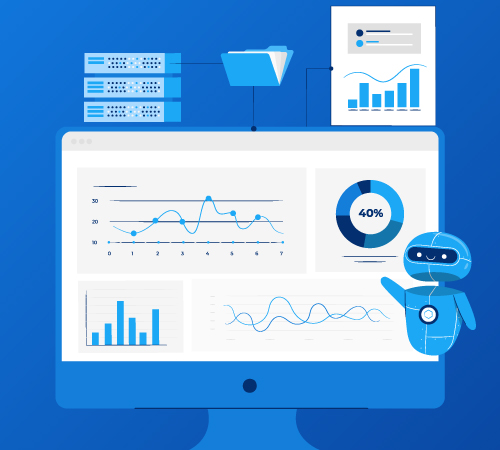Business Intelligence vs. Data Science is a hotly debated topic in the world of data analytics. Many forward-thinking organizations collect and store data to extract value and future-proof their businesses. However, the increasing complexity in volume, velocity, and variety of data makes it hard for data experts to leverage its full value.
The leading technologies that help professionals to harness the power of data include Data Science and Business Intelligence. This article will provide a deep head-to-head comparison of the two technologies and how to use them for specific business tasks.
What Is Business Intelligence (BI) And Data Science?
Let us start with the basic information about Business Intelligence and Data Science.
Data Science is a common term that incorporates different technologies, including advanced programming abilities, machine learning, and statistics. The primary goal is to extract value from a company’s data and use it to address complicated problems.
Conversely, Business Intelligence provides users with a comprehensive picture of current and historical data. Since its inception, the tool has grown into a complex data analysis method that allows business users to use data and answer specific questions.
With more organizations adopting BI, the global business intelligence market size is predicted to grow with a CAGR of 8.7% over the 2021-2028 period. It will cross an estimated value of $43.03 billion by the end of 2028.
Data Science Vs. Business Intelligence: Use Cases
Now that you know the basics of data tools, here is the comparison between their use cases.
Data Science Use Cases
- Healthcare: In the healthcare industry, medical professionals use data science in multiple ways. Reliable data solutions help diagnose diseases faster, practice preventative medicine, and explore new opportunities.
- Cybersecurity: Many cybersecurity organizations use data science and machine learning tools daily to detect new malware samples. Additionally, the tech helps users understand new ways of cybercrime in real time.
- Banks: Banks provide money on credit to clients. However, the risk of loss is high in every case. Models powered by predictive analytics help organizations predict whether future payments will be on time.
Business Intelligence Use Cases
- Cloud Analytics: As cloud technologies are widely adopted, there is a high need for BI and analytics technologies. Organizations are looking for tools that support hybrid and multi-cloud deployment technologies.
- Self-Service Analytics: The technique allows non-technical users to analyze and visualize various data sets in data sources. Data governance is a crucial component of self-service analysts that maintains accuracy and quality control about the information exchanged.
- Embedded Analytics: Several self-service BI platforms allow users to embed the analytic dashboard into regularly used apps. Incorporating analytics into existing workflows help business users obtain access to the required capabilities without leaving the operation settings.
Deciding between the two technologies depends on specific business needs and requirements. If you’re confused about how to better manage the stored business information and data, contact Inferenz experts.
Understanding Data Science and Business Intelligence Comparison
Data Types
Business Intelligence uses structured data stored in data warehouses or silos. Conversely, Data Science is charged with semi-structured, structured, and unstructured data. Therefore, Data Science requires more time to clean and improve data quality.
Business Processes
The initial step in Business Intelligence is descriptive analytics. With the help of visualizations, non-technical business users can grasp and interpret data.
On the other hand, Data Science uses an experimental method. Rather than answering business questions about performance, the tool focuses on studying data through its properties, hypothesis testing, and exploring common trends.
Deliverables
Business Intelligence deliverables include building dashboards and conducting ad-hoc requests. Conversely, Data Science deliverables focus on long-term and forward-looking projects.
Perspective
Data Science is inclined toward the future and forecasting, whereas Business Intelligence is concerned with the present.
In BI, users work on historical data to determine a responsive course of action. On the other hand, Data Science produces predictive models to anticipate future opportunities.
Complexity
The scope of BI is limited to the business domain and is concerned with dashboard creation. It focuses on the creation of business insights and the organization of data, making it easy for users to extract information.
Data Science includes advanced statistical techniques and prediction models. Thus, it is far more complex than BI.
Flexibility
Business Intelligence is a little less flexible compared to data science. Business managers must estimate data sources ahead of time in the case of BI.
Conversely, data science is highly flexible. Data scientists can add data sources as and when required.
Skills
Some essential skills required for Business Intelligence include the ability to solve problems, sound commercial acumen, creative thinking, and more.
On the other hand, the abilities necessary for data science include proficiency in Python, R, SAS, etc. Knowledge of data visualization and big data analytics tools is vital to gain insights from the stored business data.
Responsibilities
Understanding the responsibilities of BI and Data Science is vital to solving business problems. BI entails various duties, including engagement in business connectivity, data validation, source system identification, etc.
Data processing and transformation, predictive model development, fine-tuning ML models, etc., are all duties of a data scientist.
Handle Your Real-Time Data Like A Pro With Expert Solution
Even though both Data Science and Business Intelligence can work independently, combining them allows you to get quick insights to drive strategic decisions. Organizations can utilize Data Science and Machine Learning to construct hypotheses to forecast the likelihood of future projects.
Remember, handling the data in the best possible way is essential for organizations. The right tools help in managing large volumes of data efficiently. If you want to choose the best data management method between Business Intelligence vs. Data Science, contact Inferenz experts today!
FAQs
Which is better, Data Science or Business Intelligence?
Both Data Science and Business Intelligence are data-focused processes, but they have some main differences. For example, while Data Science aims to predict future events, Business Intelligence focuses on past data analysis.
Will Data Science replace Business Intelligence?
Data Science and Business Intelligence are two different disciplines. While Data Science deals with predictive and prescriptive analysis, BI deals with descriptive analysis. Hence, one cannot replace another in any aspect.
Is data analytics the same as business intelligence?
In short, data analytics is one of the most critical tools for BI. However, they are not the same. In fact, BI uses a wide range of strategies and tools, of which data analytics is fundamental.














